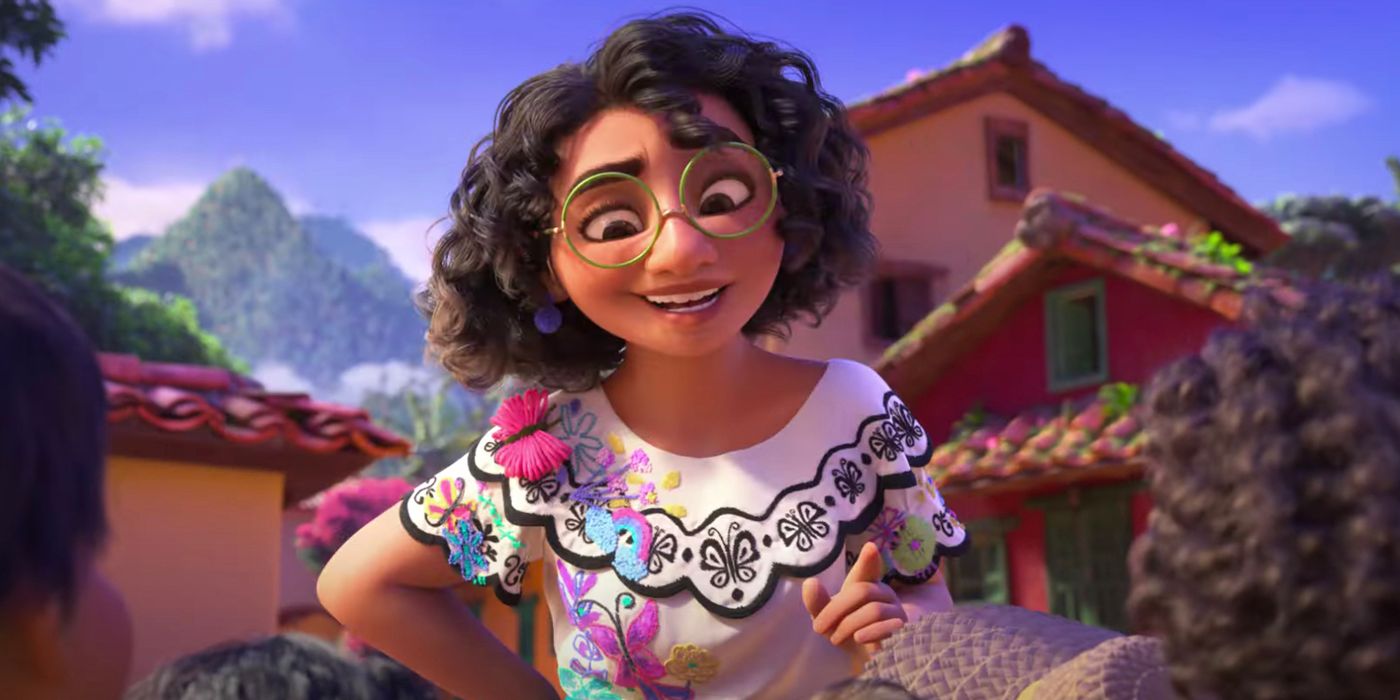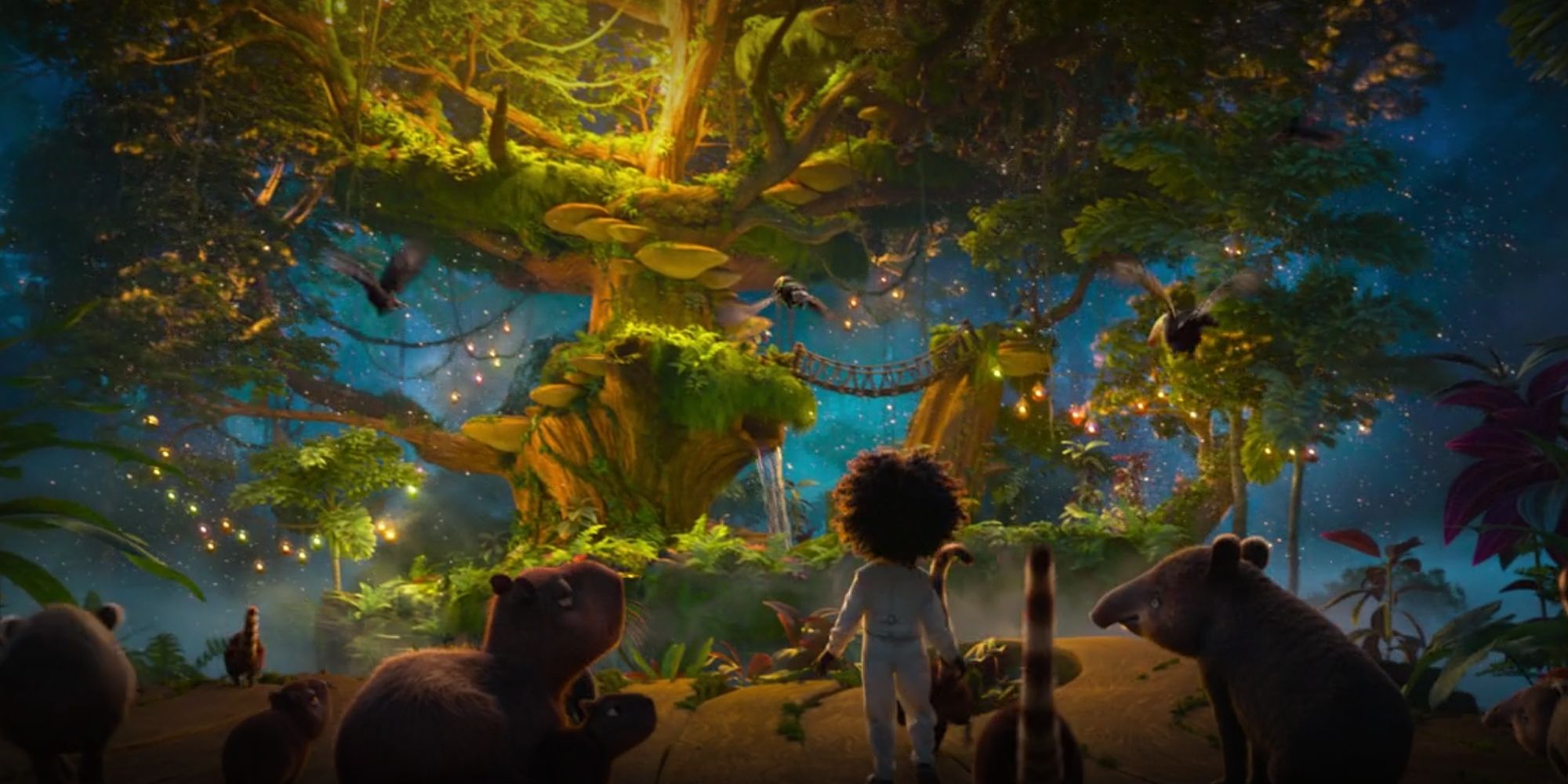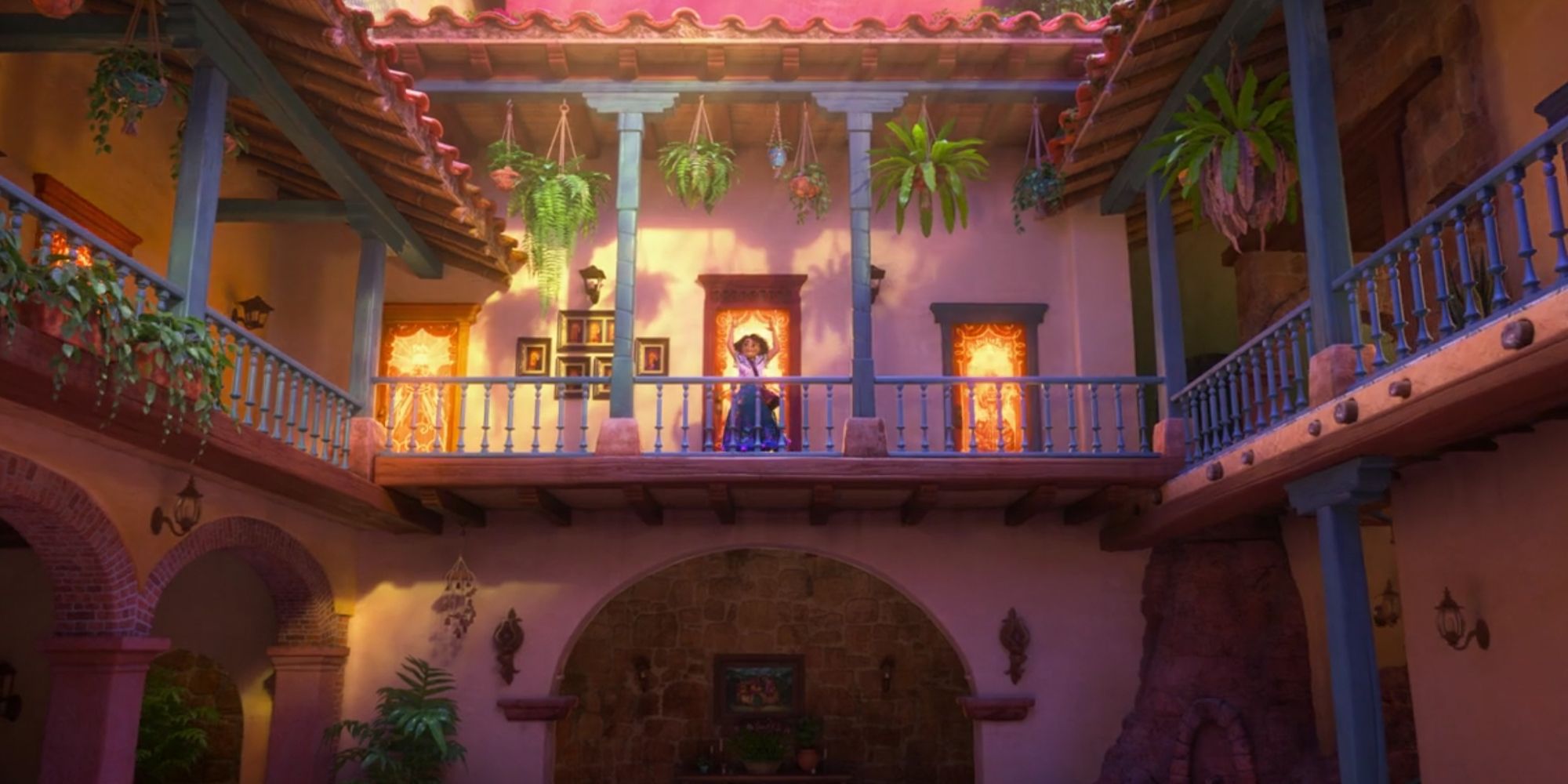
Disney's Encanto has proven to be a commercial and critical success in the few months since its release. It has already won a Best Animated Feature Film Golden Globe, and may be on track to do the same at the Academy Awards, after its Oscar nomination in the same category. In addition to telling the story of a multigenerational Colombian family, Encanto features plenty of brand new music by Lin-Manuel Miranda, including the uber-popular "We Don't Talk About Bruno" and the Golden Globe-nominated "Dos Oruguitas."
Encanto has even more to celebrate, however, as it's also been nominated for "Best Original Score" at the 94th Academy Awards. Germaine Franco, who is notably the first woman to score an animated Disney feature film, blended traditional Colombian instrumentation as well as other styles of Latin music and traditional Western orchestral pieces to create a unique musical landscape that suited the film perfectly. The music composed by Franco was further brought to life through the masterful work of score mixer Alvin Wee, who spoke to Screen Rant about his work and the rich music heard in Encanto.
Screen Rant: For anybody that doesn't have a musical background, can you just kind of quickly break down your job and your role on the film?
Alvin Wee: Right. So score mixes generally - I kind of liken it to being a chef, where you have all these ingredients. The composer creates something, and then it's my job, or my responsibility, to take all these ingredients and put them together and make sure it's presented well to the person who consumes it. In this case, the audience. And I mix it with computer software, and I record it in a studio, and I put it all together and make sure that when I work with the composer, it works together with what they intended the music to be.
And how'd you get into that? Are you a musician, or was it something you went to school for? What was your journey to here?
Alvin Wee: Well, you know, I'm a musician. I grew up playing in bands, then I went to school in Boston wanting to arrange music and also learn how to record, because where I came from there weren't a lot of technology courses. So I learned, kind of, in college. I came out here and found that passion for recording things that I could later put together, and then marry it to picture. And that's kind of how I ended up in this field.
Sure. Did you go to Berklee?
Alvin Wee: I did, I went to Berklee College of Music.
That's amazing. So when you graduated, did you just go straight to LA and look for work? How did you first start finding your way into films?
Alvin Wee: Well, I had a couple of great opportunities when I first came out here, obviously. The first thing that I learned, at least that I got involved with, was video games. And that's kind of how I got started with the beautiful orchestral writing, these very very talented composers who write towards picture, and that kind of got me started into the world of music to visual media. And then when I got here, I got in touch with a couple people - one being a record producer, another one being a score mixer who was also a record producer. He took me under his wing and said "Hey, here's what I do, and here's this film we're going to get on, and what we're going to do is take all this recorded music, put it all together, and then we will put it out for people to listen to."
Wow. So I want to come back to video games in a minute, but back to Encanto first. So it has all these wonderful songs by Lin-Manuel Miranda and features amazing music and instrumentation by Germaine Franco. What's your collaboration like with the rest of the music team? How closely are you working with them?
Alvin Wee: On something so wonderful and so involved as Encanto, we had two mixers actually - one that was mixing the songs, and me, the score mixer, who was focusing a lot on the score. And there was a lot of communication, a lot of cross-pollination when it came to the collaboration process. Because it's not just a musical but it's also a movie. It's the world of Encanto, right? And I worked really closely with Germaine to make sure that her music was properly translated, and I read into the type of music that was needed to bring the score to life. And then I went to the song mixer David Boucher, who is a good friend of mine, and said "Hey, what do you need in terms of how we work together?" and "How does the score go into the song, how does the song go back into the score?" and then we at one point also involved the re-recording mixer Dave Fluhr, who was in charge of the dialogue and how that transitioned and how that worked. So there was a lot of interplay between all of the music team, and also the post-production team.
Sure. And can you talk a little bit about the music itself? I know there are a bunch of styles of music being blended, and a lot of traditional instruments that are not really heard that much in these huge films.
Alvin Wee: Yeah, absolutely. Well, I think that was the most exciting part for me, to dive deep into traditional Colombian music and Colombian instrumentation for this movie. And when I first had this conversation with Germaine, she told me it's worth going to listen and do a little bit of reading into the styles, because in Colombia and its surrounding regions they do kind of blend into each other, but Colombia specifically has its own unique sound and unique palette. And I looked into the cumbia, which is very iconic of Colombian music. It's a dancey music, it's got this shaker rhythm, and it's got all this instrumentation that - while it may share a little bit with let's say, cumbia from different regions, it stands on its own.The scenes where you see the shot that looks like Colombia, that's the type of music that's being played. And on top of that, we recorded kind of a lot of specific instruments like the arpa llanera, which is a Colombian harp that has these pedals on top of it. When you play them you can change the tunings by flicking a couple of those switches. And then a lot of unique instruments as well that I had to study and listen to. A lot of accordion and percussion instruments. A lot of it was kind of going to Germaine and saying "Hey, does this sound like what you're thinking?" And she'd be like "Yes," and we'd figure out how we could marry that with her beautiful orchestral score as well. That was basically it.

Was it a challenge for you to start mixing these instruments you hadn't worked with so much before? Do you have to learn new techniques?
Alvin Wee: Actually, yes. The great thing about recording and mixing and all that is that there's always a baseline of people who are incredible and have done this for a long time. And from my mentor, and from the people you learn from, there are other techniques that you learn and pick up along the way. And when it comes to things like this unique, maybe something I'm not very familiar with, I think the research and the in-depth listening... there were days when I would just sit down and go on YouTube or go on some streaming service and just listen and familiarize myself with a type of music. And make sure that they were properly represented as their own thing and also represented as a thing that works with the huge arrangement and composition that Germaine wrote.
And do you feel like there's a specific scene in the film that's something you're the most proud of, or that you think is the best example of Germaine's music?
Alvin Wee: My favorite part is "Antonio's Room." By this point, I think everyone's seen the movie... It's this scene where Antonio, the kid, gets his gift, and there's this nice tropical flute that comes in. Pedro Eustache, who's a talented world musician, played a Colombian gaita, which is a flute that's kind of high pitched and very tropical. And then it transitions into this big Colombian choir piece that's very royal, huge, and at the same time very tribal. So it's very inspired by the Afro-Colombian music of the region as well as the big orchestral sound that you associate with all these big wide shots of Antonio running through his room and having all these animals and people cheering him on. And that's my favorite scene.
Oh, yeah, it's awesome. When you're working on these films, where are you working? Is this something you're doing from a home setup, or are you going to a studio and working on their gear?
Alvin Wee: Well, for Encanto, a lot of the score was recorded in many different spots, first of all. Like I said, for "Antonio's Room" where there's a choir, to get the real language and the vibe of the singers, Germaine and her team recorded that - we Skyped in to listen to the recordings in Colombia. And then there were various recording studios in the city which we recorded at, and we had all these health measures put in place during this time. We recorded in different studios just to accommodate the requirements of recording an ensemble. And then I mixed all of that in Fox at the Ford dubbing stage.
Wow. And you've also worked on some other very small movies like James Bond No Time to Die. Is the process very different between the two films? Because this is a whole musical movie. Is your job very different between the two?
Alvin Wee: Actually, it's funny, they feel very similar. Because it's all of the engineering, all of the mixing, and yet there are so many ways to kind of go around it. I found that in James Bond, there were a lot of things that were being recorded in London with Hans Zimmer and the team. And with Encanto being a musical first and foremost, we wanted to support the music in every way possible and there was a lot more intermingling between the songs and the score. And research into the cultural element of the music.

You mentioned earlier that you've also worked on some really high-profile video games like Final Fantasy and PUBG. Is that process similar to films? It's all interactive music, so is that different for you?
Alvin Wee: I mean, yes, it was interesting going from video games into film and then jumping onto a couple of video games after that. I learned that, because of the interactive nature of video games like Final Fantasy... games these days are so intelligent, they have engines that help introduce the music depending on the emotion that's needed for the situation. There's a lot more separation when it comes to recording. I would compare it to having a deconstructed burger as opposed to a burger that you have there. I know I do a lot of food analogies, it's because I love food. But you know, it's very true. Whether you need the small pieces of these individual elements, whether it's the strings, the brass, the percussion, or whatever, or you just want the whole unit as itself. In terms of recording and mixing, it is fairly similar because of just the size of the things that you get. I think it's just the amount of separation that you need between a video game and a movie.
That's really interesting. And you said you started out playing in bands. Do you do that kind of music as well?
Alvin Wee: I do. I grew up in Borneo Island in Malaysia, and growing up there... we all had a love for music and I grew up listening to bands and whatever was on the radio. Back in my day, it was Radiohead and Blink-182, and all these pop artists and all that. And I just wanted to help local bands, which I played in, to make their music sound really awesome. They would come to me with songs on the guitar and say "Hey, can you make this awesome?" and I'd be like "Yeah, sure, let's figure out a way to marry all that together." And it has been kind of a focal point of what I do in that realm, where when I work with singers or songwriters, I try to bring my experience in the visual nature of what I do into that. And also, I try to make sure that their music is as equally represented as their artistry. So it's been a good balance of both.
That's awesome. And finally, what's coming up next for you? It can be a film, game, album, anything.
Alvin Wee: Well, I think right now I'm on a DreamWorks TV thing that's kind of in the works, so that's coming out end of the year I think. And other than that, I've got a couple of songs that I'm working with on the Malaysian side that's still kind of in the process of being wrapped up, and I think I'm just looking for my next next thing and hoping that it'll be just as much fun as Encanto.
Encanto is now streaming on Disney+.
from ScreenRant - Feed https://ift.tt/xkd8Gu9

No comments:
Post a Comment